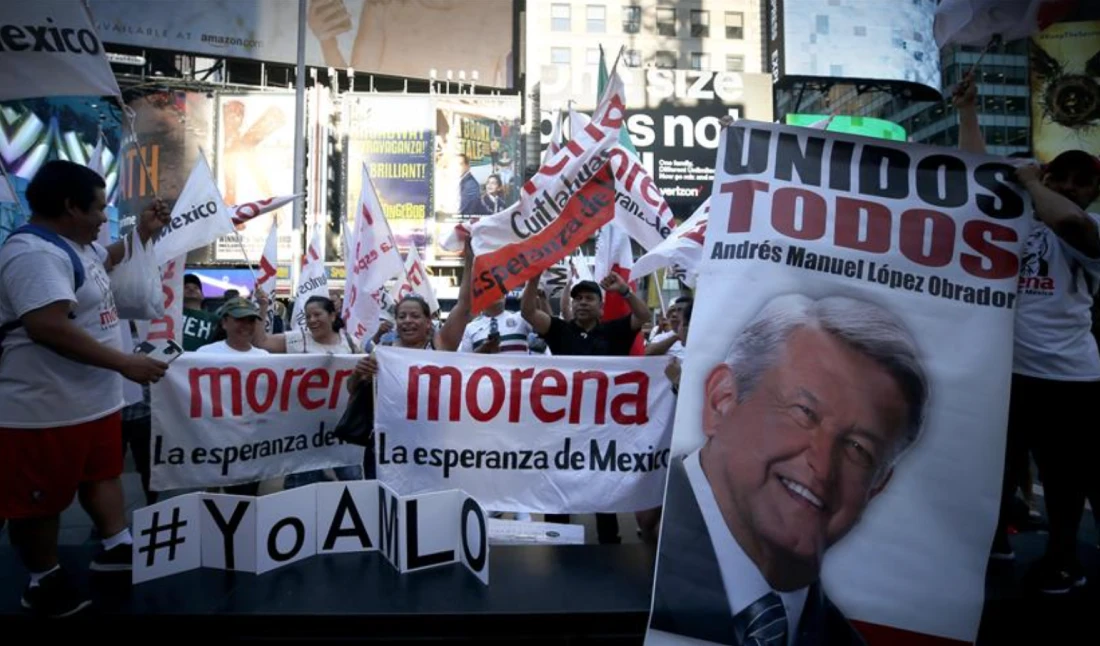Mexico’s party system is at risk of collapse. The signs are clear: opportunistic alliances between parties of different orientations; social polarization around a caudillista figure; officialdom that does not end up becoming institutionalized; a crisis of representation between parties and citizens; the appearance of business parties; black money in campaigns; etc. If the system collapses, the country will enter terra incognita since Mexican parties have been historically strong. Ironies of life: under the authoritarianism of the 20th century the parties lived better than in today’s democracy.
The degradation of the party system has long been observed, but it accelerated in the 2018 elections with the irruption of the National Regeneration Movement (MORENA), the party that President Andrés Manuel López Obrador (AMLO) founded in 2014. In that year’s elections, MORENA rose with 53% percent of the votes, reducing the traditional parties to a minimum expression. This result has given rise to two phenomena that threaten the viability of any party system. Firstly, tenuous opposition alliances between opposite parties, all together and rebellious against the ruling party. Secondly, and related to the aforementioned, the social polarization around the figure of AMLO.
In effect, the most obvious proof of the degradation of the party system is that the political debate in the country for the presidential elections of 2024 has been reduced to the person of the president. On the one hand, there is MORENA and its allies, whose only real asset is AMLO’s approval in the polls, which, although it has dropped 10 points since the beginning of his administration, has stabilized around 60% percent. On the opposition side, their only bet is to mobilize the anti-AMLO vote which, as seen in the 2021 midterm elections, has support in Mexico City.
In any case, what is certain is that the current social divisions and the positioning of the parties are around an individual who is prevented from seeking reelection. Thus, we have a system where the parties lack figures, their own profile, and public agenda issues. Besides, they are not articulating the country’s social and regional divisions.
And here we must be very careful: every day that passes MORENA is moving away from the possibility of becoming a great national party where diversity of political expressions could find a place. The President’s party has not become institutionalized and, on the contrary, its internal fractures are noticeable. This is no coincidence: AMLO does not pay attention to it and has left it in the hands of subordinates, whose only mission is to settle internal fights over candidacies. His detachment is due to the simple reason that re-election is not allowed in Mexico. Today, it is clear that MORENA was simply AMLO’s vehicle to reach the presidency, and never a long-term political project for new generations.
The degradation of the Mexican party system is surprising, given that parties in Mexico have been historically strong and have played a fundamental role in the country’s public life for almost a century. Not to mention the Institutional Revolutionary Party (PRI) founded in 1929, which dominated all areas of the country during the last century. Originally founded as a coalition of revolutionary caudillos, in the 1930s the PRI changed its profile to become a mass-based workers and peasants party. By then, it had already established itself as a hegemonic party, that is, one that does not allow other parties to compete on equal terms. Much has been written about the enormous power enjoyed by Mexican presidents emanating from the PRI. What is important to know is that this huge power was only a reflection of the centrality of the party in Mexican political, cultural, economic, and social life.
The opposition parties certainly did not have the possibility of competing in the PRI’s hegemonic system. But this was not an obstacle for them to develop strong roots among their members and rich institutional life. In 1939, the National Action Party (PAN) was founded, becoming a true school of citizenship for generations of Mexicans who longed to live in a democracy. Names such as Manuel Gómez Morín, Luis H. Álvarez, and Carlos Castillo Peraza are giants who gave soul to a party of urban middle classes. On the left, the Popular Socialist Party (PPS) founded in 1948 by the trade unionist and philosopher Vicente Lombardo Toledano attracted at the time Marxist orientation personalities of the cultural field.
These three actors: PRI, PAN, and the subsequent incarnations of the partisan left carried out the Mexican democratic transition (1977-1996). It is no coincidence that the transition began in 1977 with the approval of the Law of Political Organizations and Electoral Processes. This law elevated to constitutional rank the recognition of political parties as “entities of public interest”, and guaranteed them access to media and financial resources. Without fear of exaggeration, Mexican political parties were at the very center of the country’s democratic transition.
By the year 1996, when the transition ended, the party system inaugurated an era of stability in which the three forces were balanced in an orderly tripartite system: the PAN on the right, the PRI in the center, and the Party of the Democratic Revolution (PRD, heir of the PPS) on the left. This system successfully articulated the country’s social and regional divisions for more than 25 years. In the same period, in the rest of Latin America, the party systems collapsed like a house of cards.
The paradox here is that it seems that Mexican parties enjoyed better health under authoritarianism. The PRI was undoubtedly the hegemonic party, but so were the right and left oppositions which, although they were limited political expressions, were organized as institutions with a clear ideological profile.
There can be parties without democracy. We saw it in Mexico in the 20th century. But there cannot be democracy without parties. Everything seems to indicate that the demolition of public institutions that we have seen in recent years in Mexico will also affect the party system. We are in a bad way.
Translated from Spanish by Janaína Ruviaro da Silva













